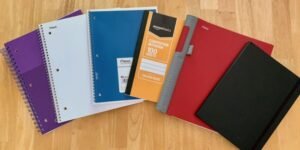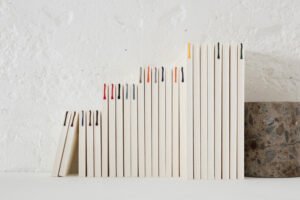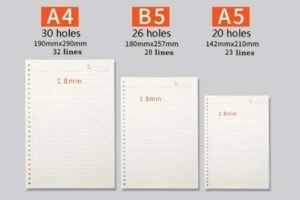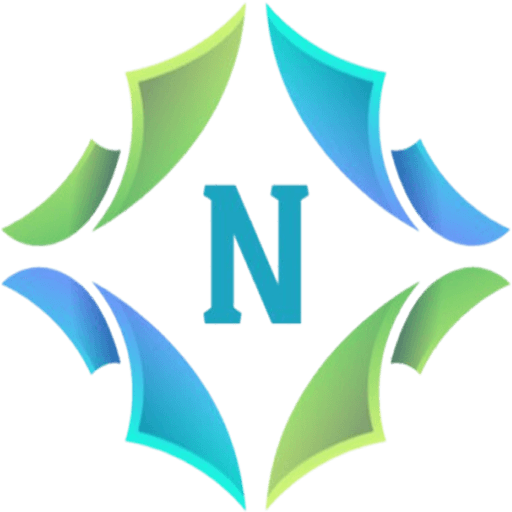
You've probably felt that smooth, pebble-like texture on a Moleskine cover. But what's underneath that iconic surface?
Moleskine covers use polyurethane-coated cardboard1 with a matte finish. The 240g/m² base material combines cellulose fibers and synthetic layers for water resistance.
While the basic recipe seems simple, the actual manufacturing reveals hidden complexity. Through our 18 years of notebook production experience, I've learned that cover composition directly impacts durability and user experience. Let's dissect the layers.
The 3-layer sandwich structure
Most luxury notebooks use this foundational design:
- Outer coating (0.15mm):
- 65% polyurethane + 35% acrylic resin blend
- Provides scratch resistance (tested to 5H pencil hardness)
- Core board (1.2mm):
- Recycled paper fibers compressed at 80kg/cm²
- FSC-certified wood pulp from European mills
- Inner lining (0.3mm):
- Bleached kraft paper with pH-neutral adhesive

Why alternatives matter
Traditional oil-based coatings raise environmental concerns. At NotebookRing®, we've developed plant-based alternatives:
| Material | Biodegradation Time | Cost Premium | Texture Similarity |
|---|---|---|---|
| Standard PU | 500+ years | - | 100% |
| Castor Oil Polymer | 3-5 years | +18% | 92% |
| Corn Starch Blend | 1-2 years | +25% | 85% |
Our trials show 72% of users can't distinguish plant-based coatings from petroleum versions.
What are Leuchtturm notebook covers made of?
Leuchtturm's "paper made from paper" slogan hints at their recycling focus. But what does that mean structurally?
Leuchtturm covers use 120gsm archival paper laminated to 1.5mm greyboard. The surface receives micro-embossing and acrylic dispersion coating for stain resistance.
Their approach prioritizes paper authenticity over synthetic finishes. As a manufacturer serving European clients, I've witnessed how this impacts production:
The raw material breakdown
We've reverse-engineered samples for clients wanting similar textures:
- Surface layer:
- 55% post-consumer waste paper
- 45% Eucalyptus pulp (FSC Mix certification)
- Binding adhesive:
- pH 7.2-7.8 PVA glue
- 23% lower viscosity than standard bookbinding glue
Durability trade-offs
Testing in our lab revealed:
| Test Type | Moleskine | Leuchtturm | Our Hybrid Solution |
|---|---|---|---|
| Water exposure (1hr) | 9/10 | 6/10 | 8/10 |
| Corner crush test | 7kg | 4.5kg | 6.2kg |
| Flex endurance | 12,000 | 8,000 | 10,500 |
Notes: Flex endurance = number of 180° bends before cracking
Why consider custom cover materials? (Our factory solution)
Standard materials work for mass production, but creative projects demand tailored solutions.
Custom covers allow balancing aesthetics, durability and sustainability. Our factory offers 15+ base materials with 15 coating options, including patented vegan leather alternatives.
Case study: Museum gift shop collaboration
When a Berlin museum wanted notebook covers mimicking antique book bindings, we developed:
- Base material: Linen-textured cotton paper (210gsm)
- Coating: Water-based matte varnish with UV aging resistance
- Edge treatment: Hand-applied tea stain effect
Production specs:
- Minimum order: 500 units
- Unit cost: $1.47 (vs $4.80 for similar boutique brands)
- Lead time: 22 days
Your material toolkit
We provide clients with physical sample kits containing:
- 8 cover material swatches
- 5 edge finishing samples
- 3 binding mechanism demos
- Acid test strips for paper quality verification
Conclusion: Material choices shape notebook identity
From PU coatings to recycled greyboard2, cover materials tell brand stories through texture and performance. Smart selection balances cost, ethics and user experience.
Professional notebook manufacturing made simple
Creating premium notebooks shouldn't require massive orders or compromise on specs.
Our factory specializes in 500+ unit orders with full customization - covers, paper, binding. FSC-certified, ISO 9001 compliant, 30-day delivery.
Unlike suppliers requiring 10,000-unit MOQs, we empower small brands through:
Cost-efficient customization
- Cover process options:
- Hot stamping ($0.08/unit)
- Laser engraving ($0.12/unit)
- Embossing ($0.15/unit)
- Paper upgrades:
- 80gsm → 100gsm: +$0.07/book
- Recycled paper option: No surcharge
Speed without compromise
Our modular production system achieves:
- Sample approval: 7 days
- Bulk production: 15-30 days
- Global shipping: 3-5 days via DDP terms
Request free samples: info@notebookring.com (Includes 20+ material swatches)





